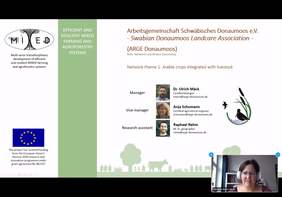Recently, the EU project ‘MIXED’ was launched which investigates the advantages of mixed agricultural and agroforestry systems (MiFAS) in terms of their impact on climate, environment and society. Between 2 and 5 November 2020, the virtual kick-off meeting took place with about 40 project partners.
They introduced the project’s bigger picture and the different work packages (WPs), and discussed upcoming steps. Amongst others, the discussions focused on how to establish the context of mixed farming in Europe, and on how to organise national workshops to allow for a reflective and participatory learning process that ultimately aims at visualising the future state of mixed farming. Moreover, in the face of developing and implementing efficient and resilient mixed systems together with various stakeholders, the data needs and methods of collection were discussed extensively.
The IfLS is mainly involved in WP1 (Developing efficient and resilient MiFAS through the multi-actor approach and transdisciplinary learning) and WP6 (Multiscale integrated assessment of efficient and resilient MiFAS). In WP1, MiFAS serve as starting points and case study networks. Different networks were introduced by the project partners during the kick-off meeting. These networks are described by a wide range of farming characteristics, including arable crops integrated with livestock, livestock and energy crops, or fruit trees with livestock. In WP6, the IfLS leads Task 6.4 on assessing the role of policy instruments in mixed farming transition strategies. These strategies will be co-constructed in the course of the project, whereas developing and evaluating improved MiFAS is a central aim. The next steps include the selection of suitable case study networks (in addition to the already included ‘ARGE Donaumoos’), and the planning of the first national workshop.
Contact persons at IfLS: Simone Sterly (sterly[at]ifls.de) and Johannes Carolus (carolus[at]ifls.de)
